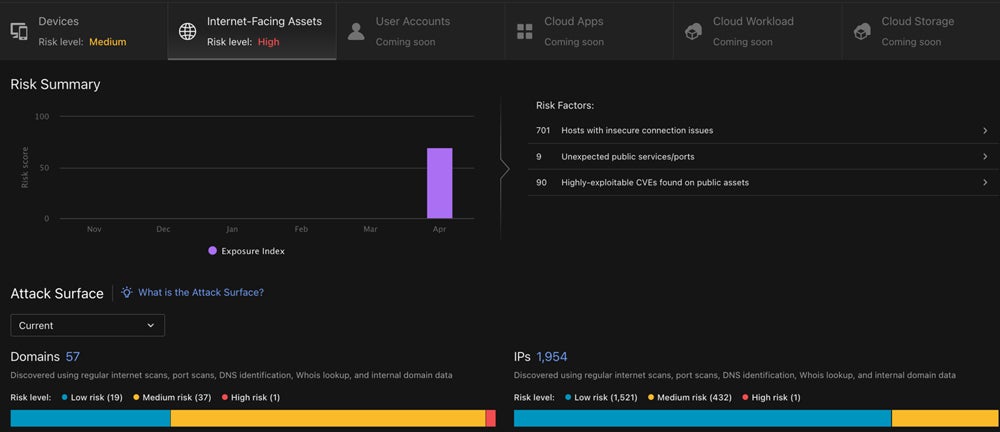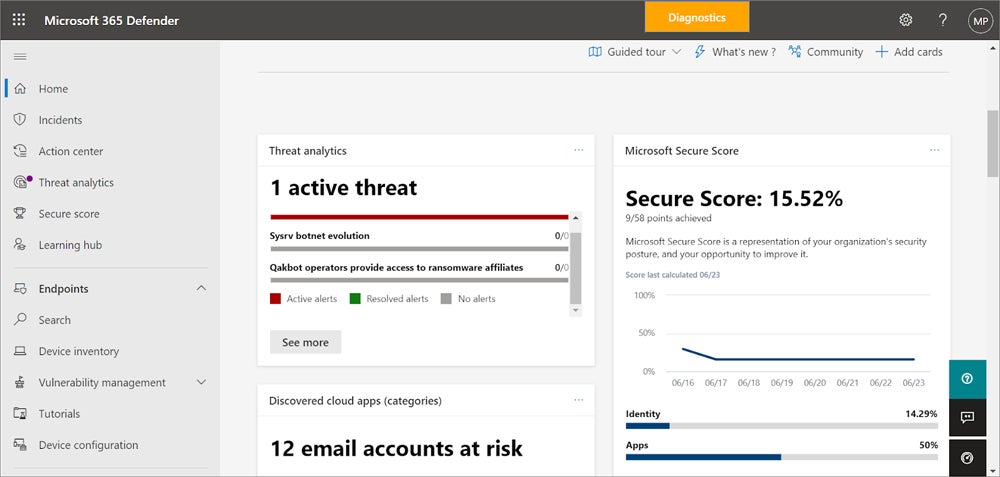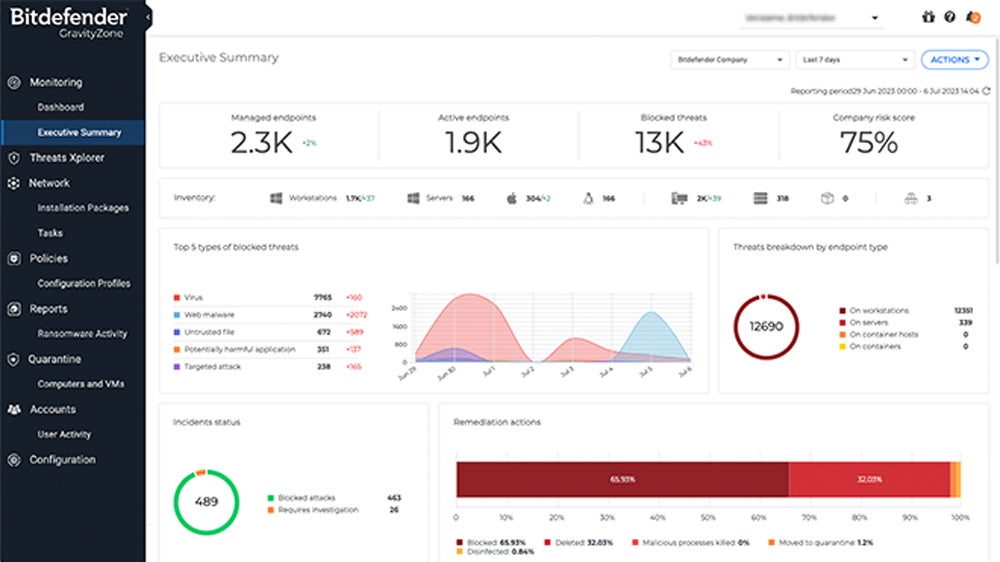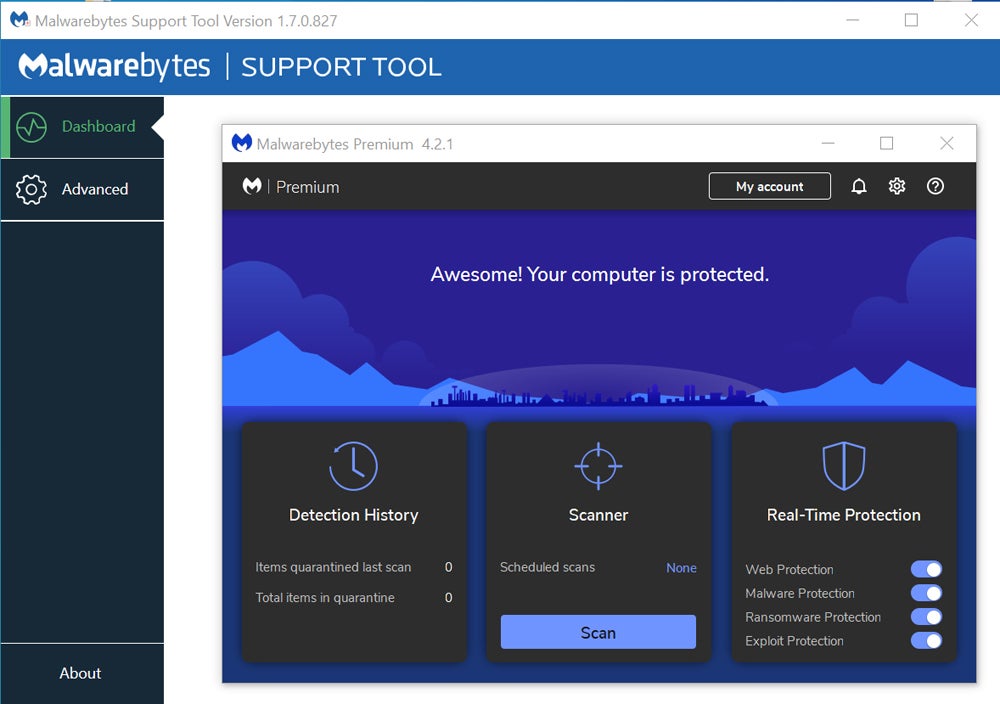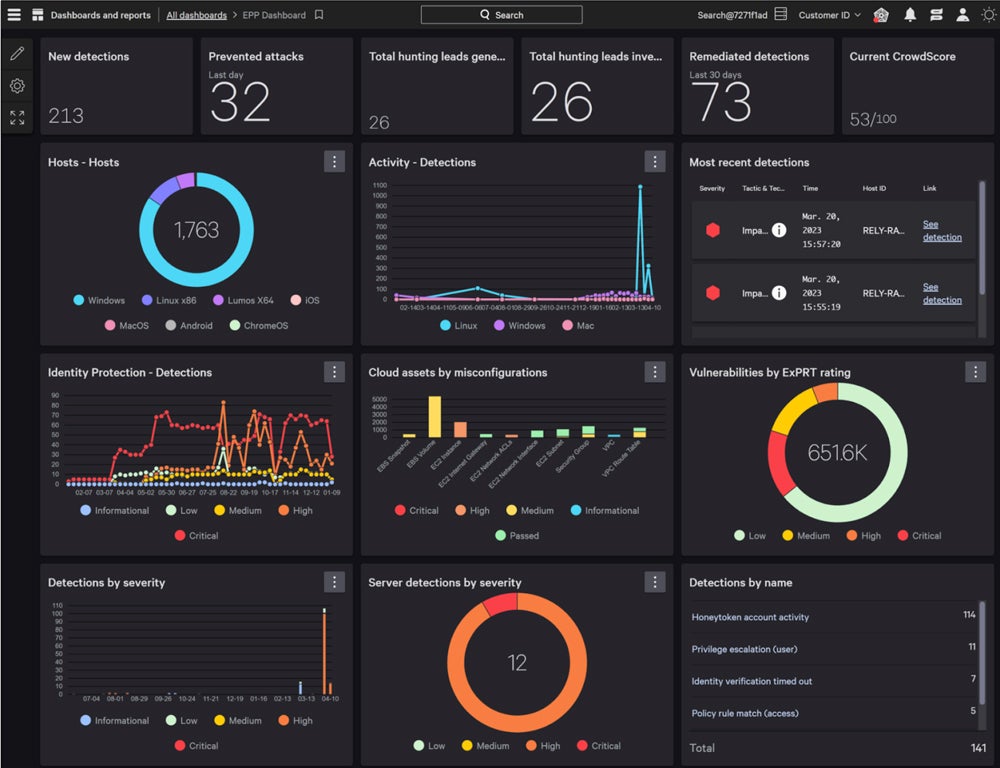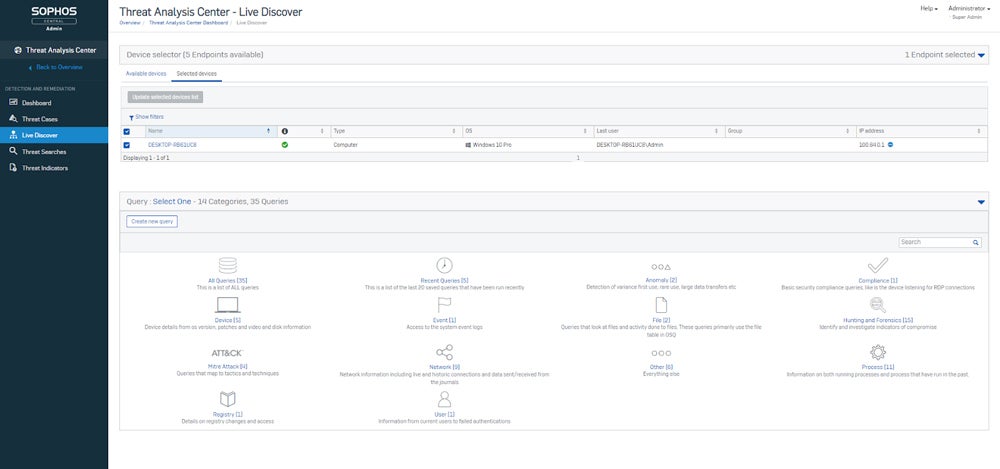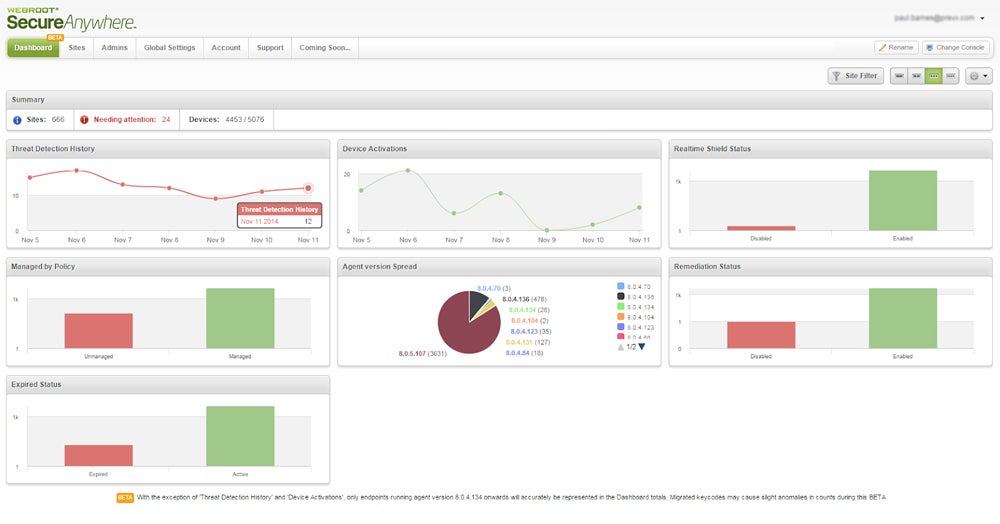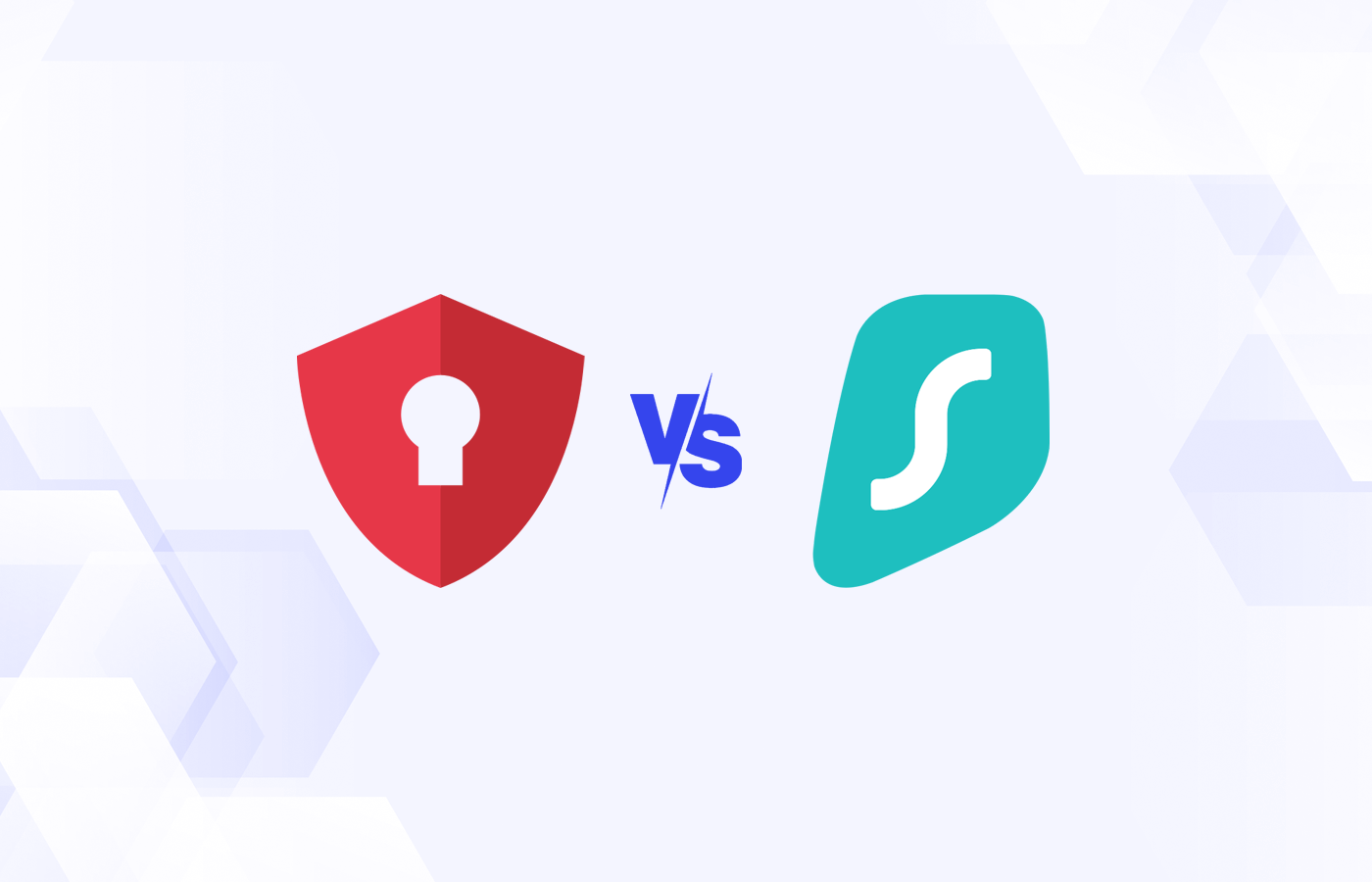An antivirus (AV) software scans, detects, prevents, and deletes malware to protect your devices. While it’s largely designed for home users and small businesses, many AV solutions now expand to business-level AV tools and full-fledged endpoint protection, offering real-time threat defense and a background shield and guard. To help you choose the most suitable software for your business, we’ve listed the top AV software and identified their use cases.
Here are the seven best antivirus software solutions:
- Trend Micro: Best overall for core features and system performance
- Microsoft Defender: Best choice for ease of use and implementation
- Bitdefender GravityZone: Best platform for pricing and transparency
- Malwarebytes ThreatDown: Best for threat eradication and isolation
- CrowdStrike Falcon: Best tool for technical and customer support
- Sophos Intercept X: Best option for advanced antivirus features
- Webroot: Best software for ultra-light system resource usage
Top Antivirus Software Comparison
This table provides a quick overview of our top AV solutions’ key features and monthly pricing for their available plans.
| Machine Learning Threat Detection | File Quarantine & Recovery | Email Protection | Multi-Platform Compatibility | Monthly Cost | |
|---|---|---|---|---|---|
| Trend Micro | ✔️ | ✔️ | ✔️ | Windows, macOS, Linux, Chrome, iOS, Android | Contact sales |
| Microsoft Defender | ✔️ | ➕ | ✔️ | Windows, macOS,Linux,Windows Subsystem for Linux, iOS,Android | Microsoft Defender for Business: $3/user Microsoft 365 Business Premium: $22/user |
| Bitdefender GravityZone | ✔️ | ✔️ | ✔️ | Windows, macOS, Linux, & add-on for mobile | Small Business Security: $16+/10 devices Business Security: $21+/10 devices Business Security Premium: $47+/10 devices |
| Malwarebytes ThreatDown | ✔️ | ✔️ | ❌ | Windows, macOS, Linux, Chrome, iOS, Android | Core: $5+/endpoint Advanced: $6+/ endpoint Elite: $8+/endpoint Ultimate: $10/endpoint |
| CrowdStrike Falcon | ✔️ | ✔️ | ✔️ | Windows, macOS, Linux, Chrome | Go: $5 for up to 100 devices Pro: $8+/ device Enterprise: $15+/device per year |
| Sophos Intercept X | ✔️ | ✔️ | ✔️ | Windows, macOS, Linux, Chrome, iOS, Android | Contact sales |
| Webroot | ✔️ | ✔️ | ✔️ | Windows, macOS, Chrome, iOS, Android | Basic: $2+/device Plus: $3 for up to 3 devices Premium: $5+ for up to 3 devices + 1 identity Premium Family: $10+ for up to 10 devices + 10 identities |
✔️=Yes ❌=No/Unclear ➕=Add-On/Limited
Each of the antivirus software in our list performed highly in various categories, but Trend Micro Vision One takes the top spot overall, providing complete core antivirus features and a solid system optimization. Continue reading for a comprehensive analysis of their pricing, customer service, usability, and advanced features, or skip ahead to see how I evaluated the products.
Note: Prices per endpoint/user are based on a one-year commitment unless otherwise noted.
Trend Micro Vision One – Best Overall for Features & Performance
Overall Rating: 4.2/5
- Core features: 4.6/5
- Pricing and transparency: 3.9/5
- Ease of use and implementation: 4.1/5
- Advanced features: 4.2/5
- Customer support: 3/5
- System Performance Impact: 5/5
Trend Micro Vision One is a cloud-native, unified endpoint security product that excels in key AV functionalities and system performance for diverse environments. Beyond its extended detection and response (XDR) feature, it delivers advanced threat defense, including deep, broad detection and automated protection. Its lightweight agents, simple third-party integration, and unified threat view also increase its value and responsiveness to security threats.
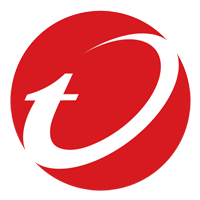
Pros
Cons
Microsoft Defender – Best for Ease of Use & Implementation
Overall Rating: 4.1/5
- Core features: 4.2/5
- Pricing and transparency: 4.5/5
- Ease of use and implementation: 4.8/5
- Advanced features: 4/5
- Customer support: 3.1/5
- System Performance Impact: 3/5
Microsoft Defender delivers an easy-to-use endpoint solution for Windows, macOS, Linux, Android, iOS, and IoT. Its free antivirus tool comes automatically installed on Windows 8 and higher, offering more convenience to Windows users. Defender highlights active issues, rank severity, and offers AI-powered protection to automate repetitive tasks for users and enhance accuracy for real-time threat detection.

Pros
Cons
Bitdefender GravityZone – Best for Pricing & Transparency
Overall Rating: 4/5
- Core features: 4.5/5
- Pricing and transparency: 4.8/5
- Ease of use and implementation: 3.9/5
- Advanced features: 4.2/5
- Customer support: 3.5/5
- System Performance Impact: 2.4/5
Bitdefender GravityZone is a multilayered endpoint security solution offering affordable, transparent pricing, and comprehensive protection features. Bitdefender directly provides detailed feature inclusions and costs for all their Business Security plans, which protect at least ten devices per annual subscription. GravityZone also provides versatile management choices, allowing teams to manage devices from cloud or on-premises management centers.

Pros
Cons
Malwarebytes ThreatDown – Best for Threat Eradication & Isolation
Overall Rating: 3.9/5
- Core features: 3.9/5
- Pricing and transparency: 4.4/5
- Ease of use and implementation: 3.8/5
- Advanced features: 3.5/5
- Customer support: 3.3/5
- System Performance Impact: 4.4/5
ThreatDown by Malwarebytes is an endpoint security solution that specializes in threat removal and isolation, leveraging on over a decade of malware detection expertise. It isolates endpoints to reduce threat dissemination while maintaining connection with the console. The solution provides accurate detection of malicious activity, immediate response by securing compromised computers, and comprehensive remediation to completely resolve security vulnerabilities.

Pros
Cons
CrowdStrike Falcon – Best for Technical & Customer Support
Overall Rating: 3.8/5
- Core features: 4.3/5
- Pricing and transparency: 3.4/5
- Ease of use and implementation: 4.1/5
- Advanced features: 3.4/5
- Customer support: 4.4/5
- System Performance Impact: 3.2/5
CrowdStrike Falcon is an AI-powered security operations center (SOC) platform that combines different security solutions. It excels in customer support and technical assistance, with three support tiers available: Standard, Express, and Elite, the latter of which includes dedicated managers and onsite visits. It offers an effective antivirus substitute by combining preventative technologies, attack visibility, and cloud-delivered protection in a single lightweight agent.

Pros
Cons
Sophos Intercept X – Best for Advanced Antivirus Features
Overall Rating: 3.7/5
- Core features: 4.5/5
- Pricing and transparency: 2/5
- Ease of use and implementation: 4.1/5
- Advanced features: 4.5/5
- Customer support: 3.7/5
- System Performance Impact: 3.3/5
Sophos Intercept X is a comprehensive endpoint protection solution offering advanced antivirus features and enterprise-level security, including extended detection and response (XDR) and zero trust network access. It uses a built-in advanced form of machine learning for deep learning and automated threat detection and blocking. For those without a dedicated security team, Sophos’ MDR service also provides 24-hour monitoring and notifications for potential attacks.

Pros
Cons
Webroot – Best Software for Ultra-Light System Resource Usage
Overall Rating: 3.7/5
- Core features: 4/5
- Pricing and transparency: 2.8/5
- Ease of use and implementation: 4.4/5
- Advanced features: 4/5
- Customer support: 2.5/5
- System Performance Impact: 4.4/5
Webroot Antivirus is ideal for minimizing system resource utilization, with a small installer of less than 6MB and a quick installation process. It swiftly completes startup activities such as virus scanning, application analysis, and system optimization while using only the necessary resources. Although it lacks remote configuration and has limited ransomware protection, it performs quick scans and provides effective real-time anti-phishing and identity protection.

Pros
Cons
Top 5 Features of Antivirus Software
To isolate attacks, effective antivirus software should include sandbox detection, machine learning for advanced threat identification, and behavioral analytics for monitoring suspicious activity. It must also provide zero-day attack prevention and extensive insight into both endpoints and applications to enable strong, proactive security for your networks against a wide range of threats.
Sandbox Detection
Sandbox detection in antivirus software simulates suspected malware in a virtual environment, or sandbox, to examine its behavior. This isolated testing prevents the virus from harming the actual network or assets, ensuring a safe evaluation prior to potential activation.
Machine Learning Threat Detection
Machine learning threat detection enhances antivirus capabilities by examining file attributes using complex algorithms and data mining, as opposed to depending primarily on heuristic methods. This approach improves detection of new, unidentified threats by assessing file patterns and features to determine whether they’re harmful without executing them.
Behavioral Analytics
Behavioral analytics are necessary in antivirus software as they give a detailed analysis of user and system activities. It detects potentially dangerous conduct by analyzing real-time data and looking for anomalies. It swiftly processes large volumes of data, providing a comprehensive view of system and user actions to improve threat detection.
Zero Day Attack Protection
Zero-day attack prevention is essential in antivirus software because it protects against newly found vulnerabilities before they’re publicly acknowledged. Next-generation antivirus (NGAV) systems mitigate threats by monitoring and analyzing routine user and system behavior to detect and stop aberrant activity, lowering the potential impact of zero-day assaults. While not perfect, NGAV significantly reduces the attack surface.
Endpoint & Application Visibility
Endpoint and application visibility features in antivirus software recognize and manage all networked devices, including laptops, smartphones, and IoT. This complete control enables you to monitor data access and application activity, ensuring strong security by identifying and controlling potential network risks across all endpoints.
How I Evaluated the Best Antivirus Software
To evaluate each antivirus software solution, I created a rubric with six essential criteria for determining product reliability. Then I scored each criterion based on the presence of certain features or services. After calculating their overall scores, I identified the top seven antivirus software. Finally, I assessed each software’s use case by focusing on their highest-scoring criterion while also examining user experiences and reviews to improve the assessment.
Evaluation Criteria
To objectively assess each tool, I first examined the core features to measure the fundamental protection capabilities of the AV software. Next, I looked at pricing and transparency to determine their value. I then assessed ease of use and implementation, followed by advanced features for complete security. Finally, I evaluated customer support and system performance to guarantee overall efficiency and user satisfaction.
- Core features (25%): I looked into the vital features, including email protection, behavioral analytics, endpoint visibility, automated incident response, attack isolation, quarantined file recovery, zero-day protection, machine learning, and more.
- Criterion winner: Trend Micro
- Pricing and transparency (20%): This category examines the availability of free trials, the standard business plan rates, home antivirus plan pricing, free versions or add-ons, and pricing transparency.
- Criterion winner: Bitdefender GravityZone
- Ease of use and implementation (20%): Factors include single management console, automated onboarding process, updated and extensive user documentation, and user review ratings for integration and ease of use.
- Criterion winner: Microsoft Defender
- Advanced features (15%): This criterion incorporates scalability, cloud or on-premises deployments, management consoles, ZTNA, point-and-click threat elimination, ransomware protection, unified endpoint services, and automatic backups.
- Criterion winner: Sophos Intercept X
- Customer support (10%): It examines the availability of various support platforms such as live chat, phone, and email assistance, the availability of live demos and training, and user ratings for support services.
- Criterion winner: CrowdStrike Falcon
- System Performance Impact (10%): I assessed the factors that contribute to device performance, such as auto-system optimization, efficient resource management, small footprint, and silent mode features.
- Criterion winner: Trend Micro
Frequently Asked Questions (FAQs)
How Does Antivirus Software Work?
Antivirus software scans in real time as you interact with files or apps. It uses signature detection to match known malware in a database, as well as generic and heuristic detection to discover new and suspected threats. Antivirus software detects malware by scanning for patterns and analyzing file structures, then confines, quarantines, or deletes it to ensure continued protection and threat detection.
How Do You Deploy Antivirus Software?
To deploy antivirus software, first uninstall any current AV solutions, and then install the new antivirus software. Evaluate your network security posture. Detect high-risk locations and deploy software accordingly, comparable to microsegmentation. Focus on PCs, email servers, file servers, and web servers based on data from your network’s highest threat levels and potential infection sources.
Should I Use Multiple Antivirus Software?
Using numerous antivirus apps on the same device isn’t advisable. They can collide, resulting in system instability, wasted resources, and possible file corruption. Each program may misidentify the other as a threat, resulting in inadequate security and redundant actions. A single, carefully chosen antivirus solution is usually more effective and dependable.
Bottom Line: Defend Your Endpoints with Antivirus Software
For SMBs using fewer devices, standalone antivirus solutions are frequently sufficient. Enterprises, on the other hand, require more advanced security measures, such as endpoint detection and response. Investing in a more complete endpoint security solution, beyond simple antivirus, is advantageous, particularly for rapidly expanding enterprises. Before you make a commitment, utilize free tools and free trials to verify that the solution matches your needs.
Business antivirus software is a foundational part of any security framework, but total security doesn’t end with just AV. For a stronger enterprise endpoint security, explore our review of the best enterprise detection and response (EDR) tools, covering their key features, strengths, and use cases.


